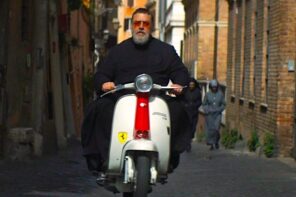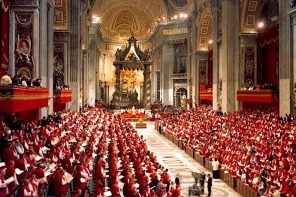On Monday, Reuters reported that in a speech to the diplomatic corps, Pope Benedict XVI had called gay marriage a “threat to the future of humanity,” which seemed to be yet another ratcheting-up of Vatican rhetoric against legal efforts to allow same-sex couples to get legally married. (That’s an ongoing project; as Reuters noted, Archbishop Timothy Dolan of New York recently said the Obama administration’s decision to stop defending the legality of the Defense of Marriage Act could precipitate “a national conflict between church and state of enormous proportions.”)
But today in the Guardian, Andrew Brown argues that the pope “didn’t say gay marriage threatens humanity”:
The pope is a Catholic; perhaps it’s in the nature of the news business to be freshly astonished by this fact every couple of months. It’s also true that the Vatican bureaucracy is arrogant, secretive, suspicious of outsiders, and given to the use of almost impenetrable jargon. Sometimes, as a journalist, you have to explain what they mean. But none of this explains, still less excuses, the claim that he had said gay marriage was a threat that undermined the future of humanity. He didn’t.
Well, did he or didn’t he? Shouldn’t be that hard to check. Here’s what the Reuters story said:
Pope Benedict said on Monday that gay marriage was one of several threats to the traditional family that undermined “the future of humanity itself”.
And here’s what the Pope said, straight from the Vatican website (emphasis mine):
In addition to a clear goal, that of leading young people to a full knowledge of reality and thus of truth, education needs settings. Among these, pride of place goes to the family, based on the marriage of a man and a woman. This is not a simple social convention, but rather the fundamental cell of every society. Consequently, policies which undermine the family threaten human dignity and the future of humanity itself.
Brown not only claims that the Pope didn’t specifically use the words “gay marriage,” he says that there wasn’t even the suggestion “that gay marriage was the most important of these [policies that threaten the family] and he didn’t mention it at all.” Really? Immediately following his naming of the family as the most important setting for the education of young people, the pope defines family as being “based on the marriage of a man and a woman,” next asserting that marriage “is not a simple social convention, but rather the fundamental cell of every society,” (language that could have come directly off the website of the National Organization for Marriage).
The Pope didn’t use the phrase “gay marriage,” but he didn’t have to; not in the context of his “marriage of a man and a woman” comment.
Brown’s argument that the Reuters article overlooked other newsworthy or higher priority items in the Pope’s address—economic justice, the environment, and violence in the Middle East—is more legitimate, but he can’t claim that the Pope didn’t suggest that gay marriage threatens humanity. He did.




